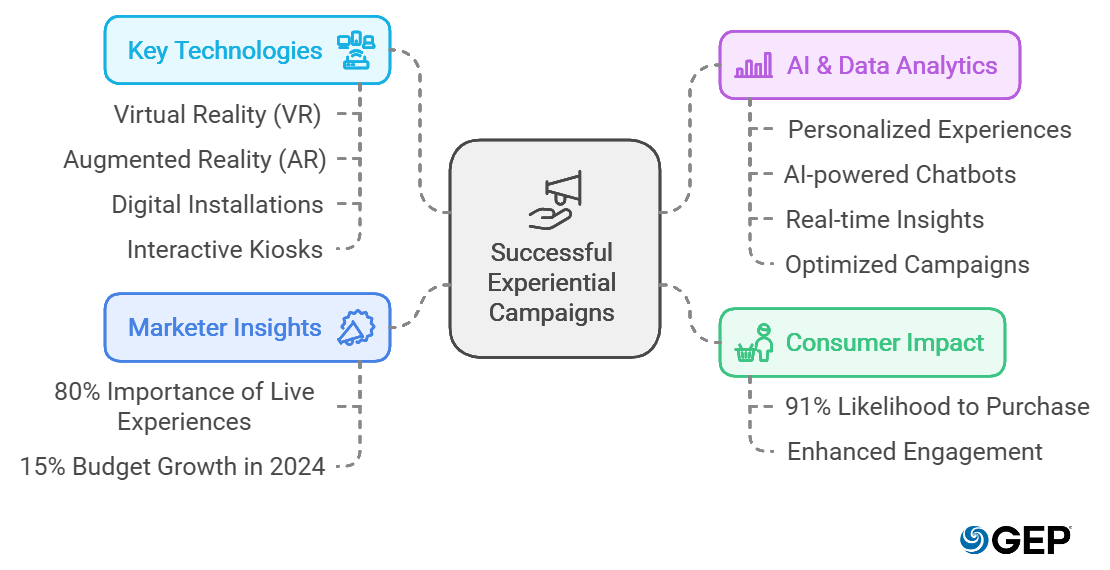
Experiential Marketing: How Brands Are Creating Immersive Consumer Experiences
- Experiential marketing immerses consumers in interactive and memorable experiences using AR, VR, and AI.
- By integrating social media and digital technologies, brands amplify the reach of their campaigns.
- Experiential marketing has shown an increase consumer loyalty and brand visibility, prompting marketers to increase budgets.
November 16, 2024 | Marketing 3 minutes read
Brands are constantly looking for innovative ways to grab attention and form lasting connections with consumers.
One approach that has gained traction is experiential marketing.
Unlike traditional advertising, which focuses on delivering messages to audiences, experiential marketing immerses consumers in interactive experiences, allowing them to engage directly with products or services.
The Rise of Experiential Marketing
This strategy not only helps in creating a memorable encounter but also fosters deeper emotional connections with the brand. By tapping into the senses and emotions of consumers, companies can create experiences that resonate long after the interaction, helping to drive brand loyalty and word-of-mouth promotion.
The impact of experiential marketing goes far beyond just a momentary interaction. By engaging consumers in a memorable way, brands can create a stronger emotional bond with their audience. When individuals establish a personal bond with a brand, their loyalty tends to endure longer.
Furthermore, the shareability of these experiences means they often have the potential to go viral, particularly when integrated with social media platforms. This can exponentially increase the brand’s visibility and credibility, as consumers are more likely to trust recommendations or experiences shared by their peers.
In addition, the effectiveness of experiential marketing can now be easily measured thanks to advancements in digital technologies. Brands can track consumer engagement, foot traffic, and social media mentions, providing valuable data to assess the success of these campaigns.
This real-time feedback allows companies to tweak their strategies on the go and optimize their return on investment.
Key Elements of Successful Experiential Campaigns
According to a recent EventTrack 2023 report, 91% of consumers are more likely to buy a brand’s product or service after participating in an event or experience.
Meanwhile, a survey by Bizzabo revealed that 80% of marketers believe live experiences are critical to a brand’s success, and experiential marketing budgets are projected to grow by 15% in 2024.
Technology has revolutionized experiential marketing, allowing brands to create more interactive and engaging experiences. Key technologies driving this trend include virtual reality (VR) and augmented reality (AR). VR technology enables brands to transport consumers into immersive environments; for instance, automotive companies can use VR to offer virtual test drives, allowing customers to experience vehicles in various settings without leaving the showroom.
On the other hand, AR enhances real-world experiences by overlaying digital information. Beyond AR and VR, digital installations have also become an effective tool for experiential marketing.
Interactive kiosks and displays in retail environments enable consumers to engage with products through dynamic, touch-based experiences. This transforms the traditional shopping experience into something more gamified and enjoyable.
For example, a global beverage maker recently installed interactive billboards equipped with motion sensors. Passersby could interact with virtual soda cans that responded to their movements, creating a fun and shareable moment that boosted social media engagement.
Artificial Intelligence (AI) and data analytics also play a significant role in experiential marketing today. AI allows brands to personalize experiences based on consumer behavior, making interactions more relevant and impactful.
AI-powered chatbots, for instance, can guide consumers through an event or experience, ensuring they maximize their interaction with the brand. In addition, data analytics provides real-time insights into how consumers engage with these experiences, enabling brands to optimize campaigns as they unfold and track their return on investment more accurately.
Brands Leading the Way
Experiential marketing has proven to be a powerful tool for engaging consumers in a way that feels authentic and personal.
With the continued advancement of AR, VR, and AI, the possibilities for creating immersive, memorable experiences are endless.
As brands look for more ways to connect with their audiences, experiential marketing will continue to be a driving force in the future of marketing strategies.
Author: Vaishnavi Borgaonkar
Sources and references:
https://www.elfo.com/blog/12-advantages-of-experiential-marketing-you-need-to-know/
https://uk.indeed.com/career-advice/career-development/what-is-experiential-marketing




